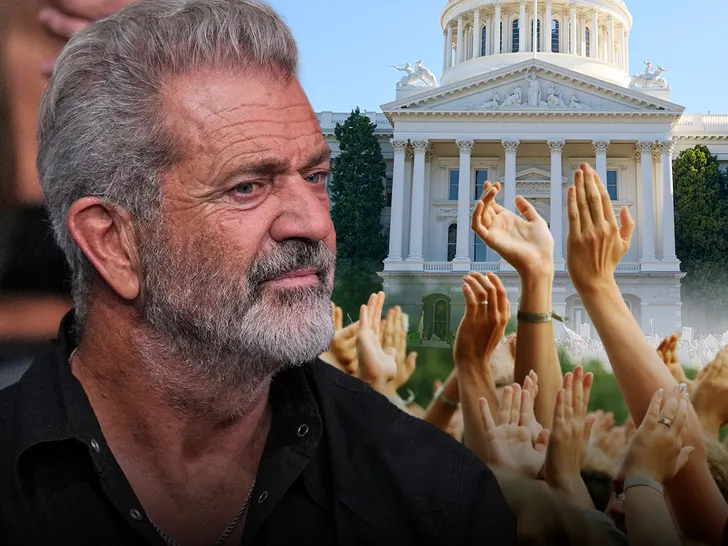Amid growing dissatisfaction with California’s political leadership, Hollywood icon Mel Gibson has unexpectedly emerged as a popular choice among Republican voters for the state’s next gubernatorial election. However, despite favorable poll numbers, Gibson has firmly declined any notion of stepping into the political arena. While he acknowledges the support, he insists that a political career is not on his radar.
This report examines the circumstances surrounding his name appearing in a recent political straw poll, his stance on the matter, and the broader implications of celebrity influence in modern politics.
A recent straw poll surveying 2,640 respondents placed Mel Gibson at the top of the list of potential Republican candidates for governor. The results showed Gibson garnering 12% of the vote, making him a leading contender among Republicans seeking a viable challenger to California’s Democratic leadership. Given his high-profile status and history of vocal criticisms against state policies, it is not entirely surprising that some voters see him as an appealing figure.
Despite this unexpected political endorsement, sources close to Gibson state unequivocally that he has no intention of running. According to reports from TMZ, Gibson is “flattered” by the public’s confidence in him but has never harbored any political aspirations, nor does he intend to change his stance.
While celebrities transitioning into politics is not unheard of—Ronald Reagan, Arnold Schwarzenegger, and Donald Trump being prime examples—Mel Gibson has maintained a relatively private life outside of his acting and directing career. Unlike Schwarzenegger, who actively campaigned and ultimately served as California’s governor from 2003 to 2011, Gibson has never shown any interest in running for public office.
Several key factors support his reluctance to enter politics:
- Lack of Political Ambitions – Unlike some celebrities who leverage their fame for political gain, Gibson has remained steadfast in keeping his career focused on filmmaking and acting rather than governance.
- Controversial Past – Gibson has faced public scrutiny for various controversial incidents over the years. While he has worked to rehabilitate his public image, entering politics would likely bring renewed attention to past controversies, making for a challenging campaign.
- Hollywood’s Political Climate – As a predominantly liberal-leaning industry, Hollywood has often been at odds with conservative political figures. A Gibson gubernatorial run would likely be met with strong opposition from many in the entertainment world, complicating both his professional and personal endeavors.
- A Private Lifestyle Preference – Over the years, Gibson has largely stepped away from the media spotlight, choosing to focus on his projects rather than public discourse. Running for office would require a significant public presence, which does not align with his current lifestyle.
While Gibson has ruled out the possibility of running, his strong polling numbers underscore an ongoing trend in American politics: the appeal of celebrity candidates. Voters increasingly gravitate toward well-known figures who they believe can bring a fresh perspective to governance. Celebrities are often perceived as outsiders who can challenge the status quo, making them particularly attractive in times of political dissatisfaction.
This phenomenon has been especially prevalent in California, where former actors like Reagan and Schwarzenegger successfully transitioned into politics. Even Caitlyn Jenner launched a gubernatorial bid in 2021, demonstrating the ongoing intersection between Hollywood fame and state politics.
However, while name recognition can be a significant advantage, governance requires an entirely different skill set. The ability to navigate complex policy issues, work with legislators, and address economic challenges demands experience that most celebrities do not inherently possess. Gibson’s decision to stay out of politics reflects an understanding that popularity does not necessarily translate into effective leadership.
Although Gibson has no interest in running for governor, he has been vocal about his dissatisfaction with California’s current leadership. His criticisms align with those of many conservatives who argue that the state’s policies on taxes, crime, homelessness, and business regulations have led to widespread discontent among residents.
Many Republicans in California are searching for a candidate who can challenge the Democratic stronghold in the state. Gibson’s high-profile criticisms and his conservative leanings likely contributed to his strong polling performance. However, his reluctance to enter the race means that GOP voters must look elsewhere for a viable candidate.
Gibson’s rejection of a political career highlights the challenges that come with celebrity-backed campaigns. While famous figures often generate initial excitement, they also face intense scrutiny and significant logistical hurdles. The appeal of a high-profile name can only go so far if the individual is unwilling to embrace the demands of public office.
Additionally, the reaction to Gibson’s potential candidacy underscores the ideological divide in California politics. While some see him as a refreshing alternative to the current administration, others argue that governance should be left to experienced policymakers rather than celebrities.
Mel Gibson’s strong showing in a recent gubernatorial poll demonstrates the continued appeal of celebrity candidates in American politics. However, his swift and decisive rejection of the idea reaffirms his commitment to remaining outside of the political sphere. While flattered by the public’s confidence in him, Gibson has made it clear that he has no interest in pursuing elected office.
His case serves as a reminder that while fame can provide a platform for political influence, it does not necessarily translate into a desire—or ability—to govern. As California’s political landscape continues to evolve, voters will need to seek out leaders who are both willing and prepared to take on the challenges of public service.


